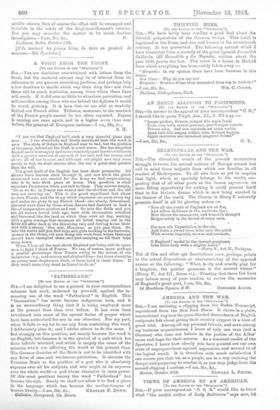A. VOICE FROM THE FRONT.
[To TEN EDITOR OF THE " SPECTATOR:1 Son,—You are doubtless overwhelmed with letters from the front, but the enclosed extract may be of interest from its reference to our present recruiting problem, and perhaps help a few doubters to decide which way their duty lies—not that there will be much hesitation among those whom these lines will reach. If it did ever so little to stimulate patriotism and self-sacrifice among those who are behind the fighters it would be worth printing. It is here that we are still so woefully behind our French allies. Tributes, moreover, to the oonduct of the French people cannot be too often repeated. France is coming out ones again, and in a higher souse than ever before, the greatest of European nations. --I am Els, Soe.,
S. H..
"I can see that England isn't such a very cheerful place just now.. . I am absolutely and firmly convinced that the worst is over. The state of things in England may be bad, but the position of Germany, behind all her bluff, is much worse. She has despoiled herself more thoroughly and more ruthlessly (and therefore hitherto with a greater measure of success) of her men and her money, and above all of her honour, and although our plight now may seem nearly as bad, we shall recover after the war a great deal quicker than she will The great fault of the English has been their prosperity. All classes have become slack through it, and now when the pinch comes and men are wanted for the A.rmy we find people asking who is to take their plate at home. This question is what !surprises Frenchmen when you talk to them. They answer simply, 'Do as we do: in France the women and the children and the old men are carrying on.' This is the great significant fact about modern France, and the thing which impresses me more every day and makes me glory in my French blood—the steady, determined, cheerful work done by those whom Nature had destined to lead a life of comparative comfort and rest. Go into the fields and you see old women bowed with age, bent with rheumatics, wrinkled and furrowed like the land on which they work all day, working with a grim courage that surpasses all belief, staying out in the fields till after dark in the drenching rain and driving home their cart with a cheery Ron soir, Monsieur,' as you pass them. Go into the towns and you find boys and girls working in the factories, women in the shops, old men doing the work from which their age should have exempted them and just parrying on till their boys coins home. When I hear all the cant about England not being able to spare men to fight I think of France. We can, of course, spare perhaps a. smaller percentage than France owing to the nature of our industries—e.g., coal-mining and shipbuilding—but there should be no young man shopkeeper, clerk, or farm-hand in these times. If they won't come they must be forced to do so."






































 Previous page
Previous page